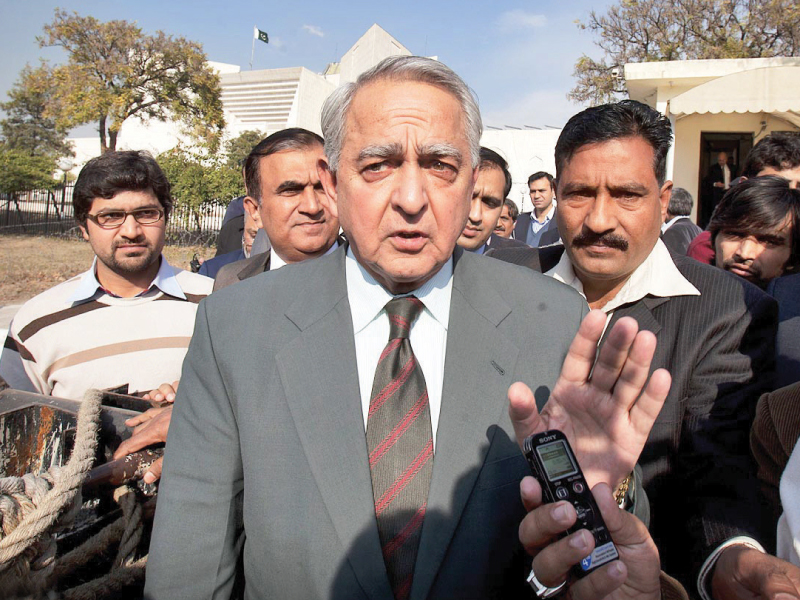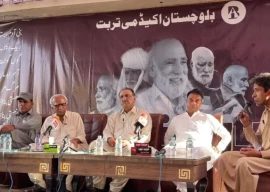
Kamran Faisal’s death took centre stage at the hearing of the rental power plants (RPPs) case on Wednesday. The Supreme Court took suo motu notice of the death of the National Accountability bureau officer, saying it could not ignore the tragic incident.
Faisal, an investigating officer in the RPPs case, was found hanging in his hostel room last week. Initial reports ruled the death a suicide, but Faisal’s family and some colleagues cried foul, requesting a judicial inquiry into the incident.
While hearing the RPPs case on Wednesday, the apex court bench changed a note submitted by the court’s registrar regarding Faisal’s death into a petition and ordered a separate bench, headed by Justice Jawwad S Khawaja, to hear the case from Thursday (today).
“It’s hard to say whether it was Kamran Faisal’s funeral or NAB’s,” Justice Sheikh Azmat Saeed remarked. He also hit out at the bureau, pointing out at the name it had earned from the tragic incident by unnecessarily delaying the implementation of court orders in the RPPs case.
During the proceedings, NAB Prosecutor General KK Agha raised objection over the registrar’s note, saying it was based on a news story. Chief Justice Iftikhar Muhammad Chaudhry, however, said the court could not ignore the incident, adding that the deceased’s family was not happy with NAB’s progress in the case.
Agha also requested the court to allow NAB to suspend the RPPs investigation till there was a decision in Faisal’s case, adding that investigation officers could not work in such a hostile environment.
“I have no right to sit on the seat of chief justice if I am not willing to discharge my duty under certain circumstances,” the chief justice responded, adding that NAB should continue investigating the RPPs case as well as Faisal’s death.
The apex court also rejected a petition requesting the court to stop hearing the RPPs case.
Former federal minister Faisal Saleh Hayat, who is also a petitioner in the RPPs case, said that Faisal was the first martyr of the RPPs case.

In its written order, the court observed, “This shocking incident of his murder/death/suicide is a sad commentary on the image of a public institution.”
“It seems that besides the colleagues of Kamran Faisal (deceased), his family members as well as the public at large have shown annoyance. According to their versions, they are not expecting an honest investigation because of the involvement of the highly influential, political persons and executive authorities of this country,” the court held in its order.
Meanwhile, at the outset of the hearing, the court did not allow the NAB chairman to address the court.
NAB officers continue protest
Demanding a fair probe, Faisal’s colleagues observed a token strike for the sixth consecutive day on Wednesday.
A handful of NAB officers from Quetta and Lahore attended the Supreme Court hearing of the RPPs case on Wednesday, despite being requested not to do so by senior NAB officials during a meeting on Tuesday.
“Earlier, the number of officers who were going to the court was well above 50 but it dropped after a ‘successful’ meeting with NAB directors who warned that the bureau’s chief could resign if the officers attended the hearing,” said a NAB official.
Meanwhile, a case regarding Faisal’s death is yet to be registered. His brother-in-law Hamid Munir earlier told The Express Tribune that NAB had conveyed to them that they would file an FIR application.
However, a NAB officer ruled out any possibility that the bureau would contact the police for a case registration. “In a suicide case, the department cannot file an FIR; rather it should be state doing so.”
On the other hand, a senior police official said, “The state can become a complainant and file an FIR application only in case the deceased has no family or relatives known.”
He added that the SC bench hearing the case could direct the police to register an FIR declaring that the deceased had no known immediate family members available to do so.
With additional reporting by Umer Nangiana in Islamabad
Published in The Express Tribune, January 24th, 2013.
COMMENTS (2)
Comments are moderated and generally will be posted if they are on-topic and not abusive.
For more information, please see our Comments FAQ






1732427746-0/Copy-of-Untitled-(2)1732427746-0-270x192.webp)










One thing is missing in the statement of the judge and that is ' or of Justice/ SC'.NAB and Police have been made totally ineffective/destroyed by interference of the SC.
SC is also part of this all mess as they were either unable to give decisions or implement them.